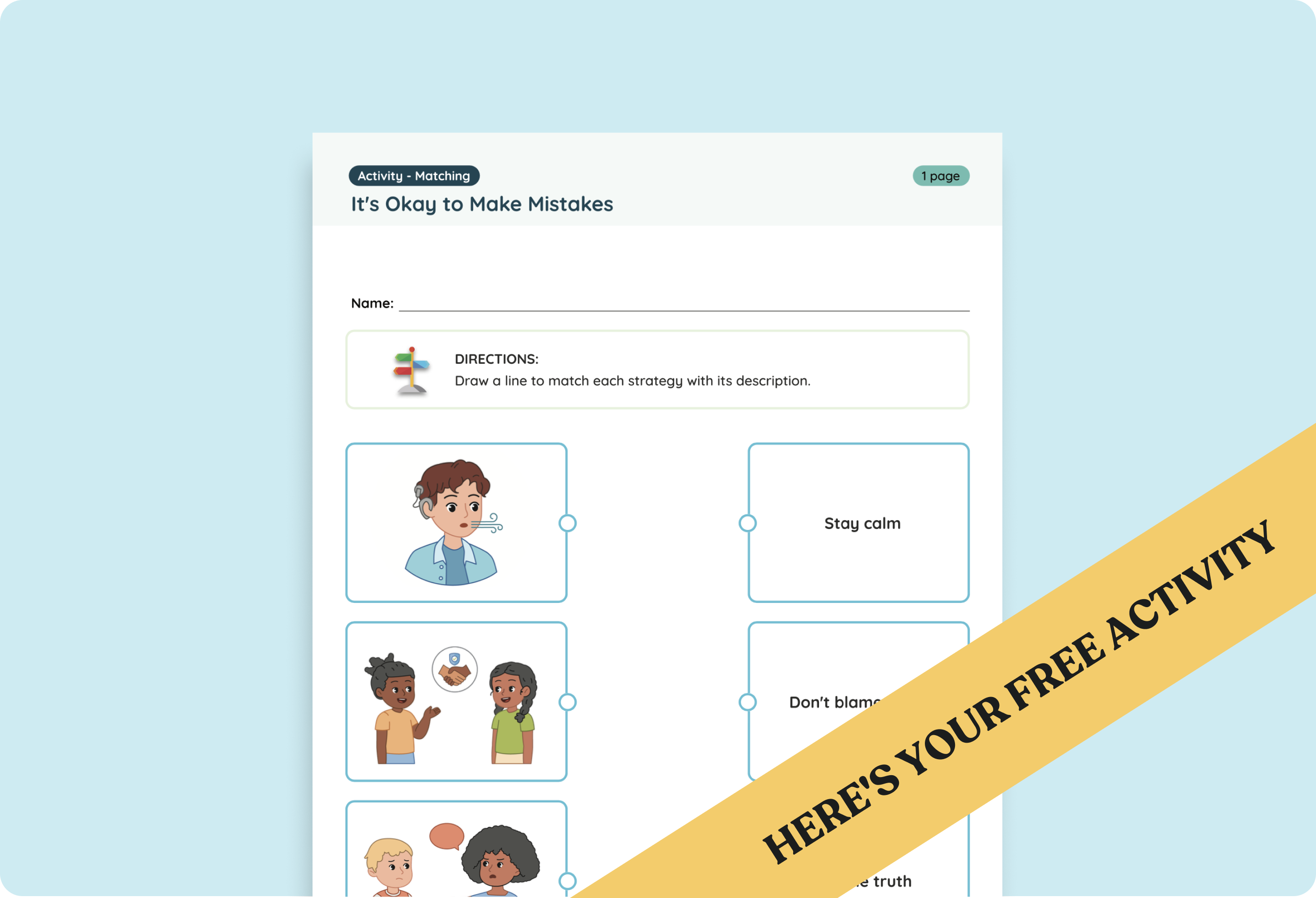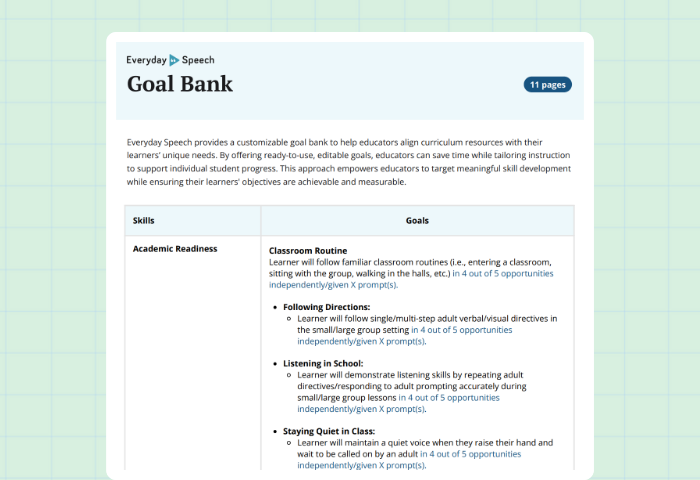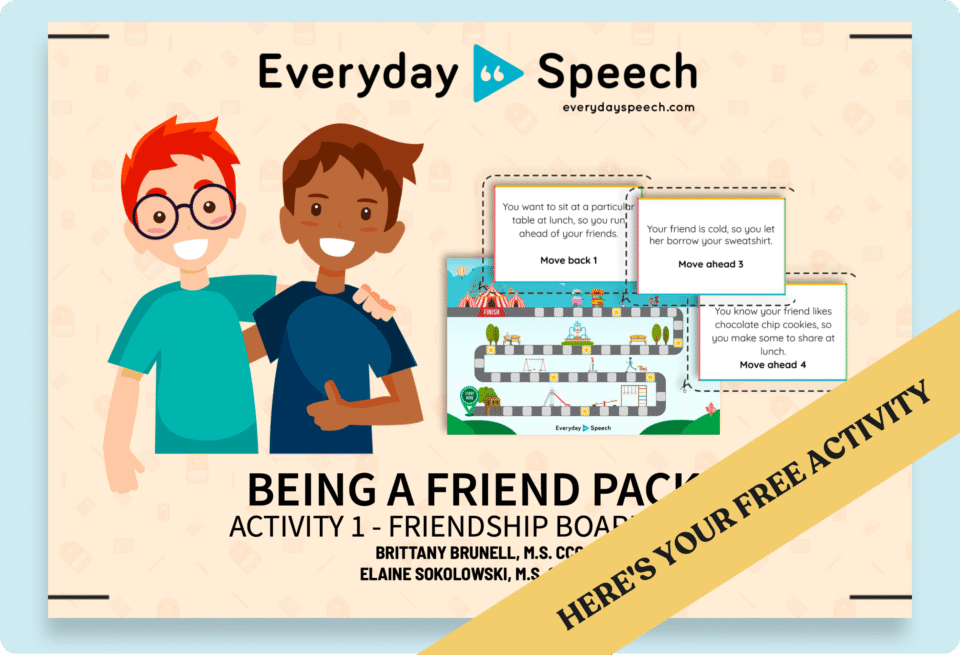Pre-K & Kindergarten Friendship Skills Activity: It’s Okay to Make Mistakes
Get free social skills materials
No-prep lessons on self-regulation, emotional recognition, conversation skills, and more.
Sign up hereHelping preschoolers and kindergarteners build foundational friendship skills is a critical aspect of their early education. Many young children fear making mistakes, which can sometimes become a barrier to forming and maintaining friendships. The ‘It’s Okay to Make Mistakes’ no-prep activity resource from Everyday Speech provides school-based clinicians with an engaging, developmentally appropriate activity for teaching the essential skill of working through mistakes in social interactions.
By guiding students in understanding that everyone makes mistakes, and that these moments can actually strengthen relationships, this tool sets a positive foundation for empathy, communication, and resilience in the youngest learners.
What Are Friendship Skills?
Get Free Activities for Friendship Skills
Printable lessons, games, posters, and interactive activities that teach essential friendship skills with zero prep required
Friendship skills are the social abilities that help children initiate, build, and maintain relationships with peers. For pre-kindergarten and kindergarten students, this covers basic concepts like sharing, taking turns, using kind words, cooperating, recognizing emotions in others, and working through misunderstandings. These skills often develop through repeated interactions with adults and peers, as well as targeted instruction and guided practice in a safe and supportive environment.
Related resources: See our full list of social skills lessons.
The ability to make, keep, and grow friendships does not come naturally to every child. Young children, especially those who struggle with communication or who are new to group settings, may not yet recognize that making mistakes with friends—such as accidentally hurting someone’s feelings or not sharing a toy—is normal. When students learn to navigate these challenges, they are more likely to build stronger peer connections and develop confidence in social situations.
Why Teach Friendship Skills?
Cultivating friendship skills addresses fundamental needs in the social and emotional development of young children. Specifically, teaching children that mistakes are an expected part of interactions provides several key benefits:
- Fosters emotional resilience when students experience minor social setbacks.
- Encourages students to approach peers with openness and build new friendships.
- Increases self-esteem by normalizing mistakes and reducing feelings of shame or embarrassment.
- Improves problem-solving abilities by allowing children to learn how to repair relationships after misunderstandings.
- Supports classroom harmony by reducing conflict escalation and promoting empathy.
- Equips children with language and strategies to express their feelings and needs constructively.
- Creates a classroom culture where students feel safe to be themselves, take risks, and grow through challenges.
These outcomes provide a strong foundation for both academic learning and lifelong social interaction.
Lesson Plan: Using It’s Okay to Make Mistakes
The ‘It’s Okay to Make Mistakes’ activity (available for download here) is a visually appealing, discussion-based activity designed for whole class, small group, or individual sessions. The resource introduces the concept that mistakes are an expected and accepted part of friendship, not something to fear or hide.
Step 1: Introduce the Concept
Start by gathering students together in a comfortable space. Set the tone by reassuring everyone that everyone—children and adults alike—make mistakes. Use warm, inviting language such as, “Today we’re going to talk about what happens when we make mistakes while playing or talking with our friends.”
Show the first page of the handout, which features friendly illustrations and simple statements about making mistakes. Read through the text together. Pause at key moments to ask students what they think about the scenarios shown. For example,
- “What would you feel if you knocked over someone’s blocks by mistake?”
- “Has anyone ever made a mistake like that before?”
Encourage students to share their experiences and feelings, reassuring them that all responses are welcome.
Get Free Activities for Friendship Skills
Printable lessons, games, posters, and interactive activities that teach essential friendship skills with zero prep required
Step 2: Guided Discussion Using the Resource
Continue with the discussion prompts and visuals. The story provides relatable examples, such as forgetting to share a toy or spilling a drink. Invite students to talk about what they see happening and how the characters might feel.
Focus the conversation on the following themes:
- Mistakes do not make someone a bad friend.
- Everyone makes mistakes, even grown-ups.
- Friends forgive each other and can work through accidents or misunderstandings.
Guide students in thinking about how they might react if the same situation occurred. Use prompts like,
- “What would you say to a friend who made a little mistake while playing?”
- “How do you think the characters could help each other feel better?”
By keeping the discussion child-centered and supportive, students are more likely to internalize the idea that making mistakes is a shared human experience.
Step 3: Practice with Scenarios
Refer to the interactive activity sheets at the end of the PDF. These pages provide students with prompts to reflect on their own experiences with mistakes in friendships. For whole group or circle time, read each scenario aloud and invite students to role-play responses. This might include practicing apologizing, forgiving, or offering reassurance.
For small group or one-on-one sessions, allow students to draw or act out their own examples using the simple fill-in activities. Assist students in expressing their feelings and brainstorming what they could say or do next time.
Encourage responses such as,
- “It’s okay. Let’s try again together.”
- “I forgive you. Let’s keep playing.”
Model language and body language that reflect empathy and solution-seeking.
Step 4: Reinforce with Visual Supports
The resource provides child-friendly visual cues that help solidify the lesson. After the guided activity, display key phrases or illustrations on the board or create a ‘Friendship Wall’ with children’s drawings about making up after a mistake. Consider using the printed sheets as visual reminders throughout the classroom, especially in areas where students interact most often.
These visual supports offer ongoing reinforcement of the message, helping students remember strategies for working through mistakes in real situations.
Supporting Friendship Skills After the Activity
A single lesson can introduce core ideas, but lasting skill development happens through ongoing support and repetition. To continue fostering friendship skills:
Create a predictable routine for acknowledging and repairing small mistakes. When children experience a social mishap, offer gentle prompts that mirror the lesson language. For example, encourage children to use phrases from the PDF or model responses such as, “It’s okay to make mistakes. What can we do next?”
Integrate the ideas from the activity into daily classroom practices:
- Use morning meeting time to review what was learned and give children opportunities to share success stories about overcoming mistakes.
- Highlight examples of peer forgiveness and cooperation when they naturally occur, giving positive feedback to those involved.
- Offer additional role-play opportunities with puppets or story books that reinforce the same themes.
- Collaborate with caregivers by sending home a summary of the lesson, along with key phrases children can practice at home.
Additionally, observe students during unstructured social times. Step in with support or reminders as needed, and connect back to the lesson visuals and language when coaching through conflicts. Regularly review the concept of normalizing mistakes, offering frequent encouragement so that all students continue to feel secure in their developing friendships.
Wrapping Up: Building Resilience Through Friendship Skills
Teaching young children that it is okay to make mistakes within friendships provides a powerful foundation for their growth as compassionate, resilient individuals. The ‘It’s Okay to Make Mistakes’ activity resource offers a no-prep, accessible path for clinicians to introduce this topic in a relatable and supportive manner. When students learn to accept mistakes as opportunities to communicate, apologize, and forgive, they are much more likely to take social risks and build lasting peer relationships.
Keep reinforcing these lessons with repeated praise for empathy, solution-seeking, and courage when navigating challenging moments. Over time, students who are encouraged to see mistakes as part of learning will be more likely to collaborate, self-advocate, and approach new friendships with confidence. With consistent practice, the classroom community becomes a place where compassion and understanding thrive—laying the groundwork for strong social development throughout childhood.



